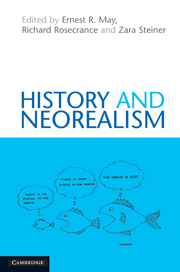Book contents
- Frontmatter
- Contents
- List of tables
- Notes on contributors
- Acknowledgments
- 1 Theory and international history
- 2 Transformations in power
- 3 Domestically driven deviations: internal regimes, leaders, and realism's power line
- 4 How international institutions affect outcomes
- 5 Not even for the seventeenth and eighteenth centuries: power and order in the early modern era
- 6 Austria-Hungary and the coming of the First World War
- 7 British decisions for peace and war 1938–1939: the rise and fall of realism
- 8 Realism and risk in 1938: German foreign policy and the Munich Crisis
- 9 Domestic politics, interservice impasse, and Japan's decisions for war
- 10 Military audacity: Mao Zedong, Liu Shaoqi, and China's adventure in Korea
- 11 The United States' underuse of military power
- 12 The overuse of American power
- 13 Redrawing the Soviet power line: Gorbachev and the end of the Cold War
- 14 Shared sovereignty in the European Union: Germany's economic governance
- 15 John Mearsheimer's “elementary geometry of power”: Euclidean moment or an intellectual blind alley?
- 16 History and neorealism reconsidered
- Index
- References
2 - Transformations in power
Published online by Cambridge University Press: 05 June 2012
- Frontmatter
- Contents
- List of tables
- Notes on contributors
- Acknowledgments
- 1 Theory and international history
- 2 Transformations in power
- 3 Domestically driven deviations: internal regimes, leaders, and realism's power line
- 4 How international institutions affect outcomes
- 5 Not even for the seventeenth and eighteenth centuries: power and order in the early modern era
- 6 Austria-Hungary and the coming of the First World War
- 7 British decisions for peace and war 1938–1939: the rise and fall of realism
- 8 Realism and risk in 1938: German foreign policy and the Munich Crisis
- 9 Domestic politics, interservice impasse, and Japan's decisions for war
- 10 Military audacity: Mao Zedong, Liu Shaoqi, and China's adventure in Korea
- 11 The United States' underuse of military power
- 12 The overuse of American power
- 13 Redrawing the Soviet power line: Gorbachev and the end of the Cold War
- 14 Shared sovereignty in the European Union: Germany's economic governance
- 15 John Mearsheimer's “elementary geometry of power”: Euclidean moment or an intellectual blind alley?
- 16 History and neorealism reconsidered
- Index
- References
Summary
Summary introduction
Contributors to this volume contend that countries act in ways that sometimes violate established patterns of power among them. Countries with less power are sometimes egregiously ambitious and aggressive; countries with more power sometimes do not assert it politically. In the chapters which follow, authors explain that domestic politics, particular tendencies of leadership, or feelings of national dissatisfaction (or satisfaction) may account for the deviation from expected power outcomes. The present chapter offers another reason for this discontinuity: the very notion of what constitutes “power” may have been in flux and transformation. In very general terms it appears that major nations have changed short-term into long-term time horizons – territorial objectives into economic ones, tangible into less tangible ones, extensive development strategies into intensive ones. Normative transformations have occurred as well. These have permitted states to derive the benefits of cooperation within institutional frameworks and regimes – benefits that would not accrue outside such institutions. Participants in such regimes have been able to save on defense and security costs, attaining rates of growth not permitted to heavily armed states incurring large defense burdens.
Analysts and historians agree that some states act – use their power – differently from others. Yet, traditional realists cannot explain why certain countries apparently exercise more power than they possess, taking excessive risks, while others use much less of their power, becoming hesitant or even isolationist.
- Type
- Chapter
- Information
- History and Neorealism , pp. 8 - 28Publisher: Cambridge University PressPrint publication year: 2010
References
- 1
- Cited by



